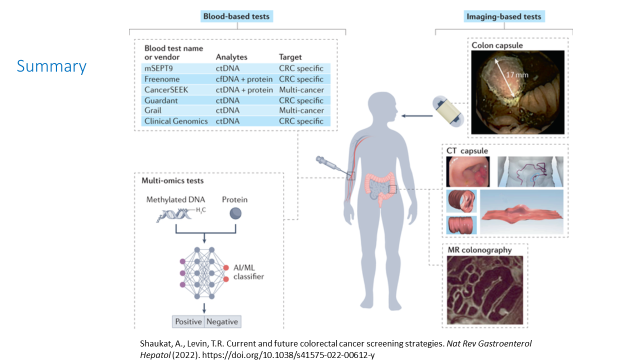
With new, non-invasive colorectal cancer (CRC) screening tests on the horizon, gastroenterologists must start thinking now about how to incorporate them into their practice, according to Aasma Shaukat, MD, MPH, professor of medicine and population health at NYU Grossman School of Medicine, who presents on the topic at Digestive Disease Week® (DDW) 2023.
DDW News spoke with Dr. Shaukat about what gastroenterologists can expect from these new modalities.
DDW: What new non-invasive CRC screening tests are available or are expected to be available soon?
Shaukat: There are three categories of novel non-invasive or minimally invasive CRC screening modalities.
- Stool-based tests: Two stool-based tests are FDA-cleared, a fecal immunochemical test and a multi-target stool DNA test. More are being tested in clinical trials.
- Blood-based tests: A lab-based test is available to patients able to pay out of pocket, while the FDA-cleared Epi proColon® test is indicated for patients unwilling or unable to undergo other screening modalities. In addition, several tests have completed their clinical trials with promising preliminary results.
- Imaging-based tests: Colon capsules and computed tomography (CT)-based capsules sit in-between completely non-invasive tests and invasive tests. These tests not only act as a screening tool to identify cancer but can also identify polyps. Colon capsule is currently available for patients unwilling or unable to undergo other screening modalities. Pivotal studies for both imaging tests as primary screening tools are starting soon in the U.S.
DDW: How has the uptake of non-invasive CRC screening modalities changed?
Shaukat: The momentum for non-invasive CRC screening modalities continues. The NordICC trial showed no reduction in colon cancer mortality in those invited to receive screening colonoscopies compared to those who were not. This may put a damper on the uptake of screening colonoscopies and its effectiveness as a programmatic modality and has increased interest in non-invasive options, which lend themselves nicely to programmatic approaches.
DDW: How will implementation of non-invasive CRC screening tests impact the use of colonoscopy?
Shaukat: There seems to be a concern among gastroenterologists that non-invasive screening will decrease the need for colonoscopy. But actually, the opposite is true. Expanding the use of non-invasive tests will increase the number of patients screened. As the number of individuals with a positive non-invasive test increases and more patients enter the surveillance pool, it may offset the drop in screening colonoscopies.
DDW: What challenges do you see in implementing non-invasive tests?
Shaukat: The area is expanding, which creates both opportunities and challenges. Some unanswered questions that remain include:
- How will these tests perform in real-world settings?
- How do we implement them into care? It may not be feasible to offer every available modality.
- Will these tests be used in addition to what we currently offer or in place of it?
- Who will be taking these tests? Ideally, we want to expand the screening population. If the barrier for these patients is the modality, will offering less-invasive tests help get them in the door?
DDW: What advice do you have for gastroenterologists looking to incorporate these tests in their practice?
Shaukat: First, tailor your offerings to what works best for your patient population. You don’t have to offer every test available. Patient preference, logistics and available resources will play a big role in determining which tests you offer. For example, mailing a stool-based test may be much easier for populations that have to travel long distances. In other settings, mobile phlebotomy or incorporating blood-based tests into other common lab tests may be appropriate options.
Finally, we have to ensure health equity. In CRC screening, new tests are often very expensive and end up only being available to those with good access to care. We need to address any barriers in the system to make these tests widely available.
Dr. Shaukat’s oral presentation, “Updates in non-invasive colorectal cancer screening: what’s here and what’s coming” on Saturday, May 6, at 4 p.m. CDT is part of the session “AGA Hot Topics in Colon Cancer Screening and Surveillance.”
If you’re attending DDW, your registration includes access to a recording of this session, available to watch at your convenience until May 17, 2024. Session captures will be released 24 hours after the session ends. Non-attendees can also purchase access to DDW On Demand to watch session recordings after DDW ends.




